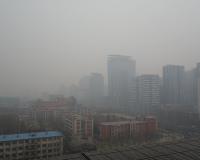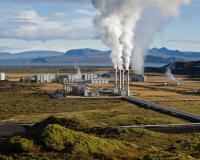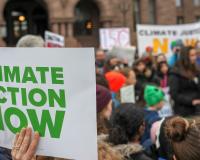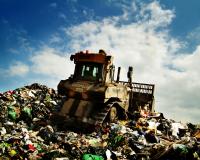
Vibrant Environment
Climate Change And Sustainability
All | Biodiversity | Climate Change and Sustainability | Environmental Justice | Governance and Rule of Law | Land Use and Natural Resources | Oceans and Coasts | Pollution Control

As our global energy demand continues to rise, our dependence on renewable energy sources will inevitably increase as well. The offshore wind industry is a fairly new sector within the energy space. Although the United States is already one of the world’s largest onshore wind energy markets, there remains a substantial amount of growth potential off of our shores.


It’s amazing how quickly humanity’s concern can shift when circumstances demand it, and the coronavirus pandemic has riveted our attention. Even today, Earth Day, talking about anything else risks seeming detached or indifferent to the enormous suffering, disruption, and dislocation that the COVID-19 virus has unleashed on the world. But I need to alert you to a new ELI report analyzing the other major challenge that will be waiting for us on the other side of our current crisis, one that, like the pandemic, is deeply informed by science.

Nearly four billion people worldwide are under government mandates to socially distance themselves from one another in order to “flatten the curve” of COVID-19. Non-essential workers are hunkering down at home, bringing the daily commute and air travel to a virtual halt. The resulting decline in air pollution is stunning, visible even in satellite images.

In “Animal Agriculture Liability for Climatic Nuisance: A Path Forward for Climate Change Litigation?,” Prof. Daniel E. Walters lays out a new path for climate litigation: environmental litigators should bring federal public nuisance suits to remedy environmental harms caused by animal agriculture.

It is now half a century since the first Earth Day. Not only did I help run our school’s “teach in” in 1970, it is also 50 years since my entrance into environmental journalism. A first-person history may help to affirm the importance of the environmental protections that soon followed, as well as of a robust student press to push today’s issues.

“Not everything that can be counted counts, and not everything that counts can be counted.”—William Bruce Cameron
“Better three hours too soon than a minute too late.”—William Shakespeare

The Yale-Harvard football contest the weekend before Thanksgiving each autumn is known as “The Game” by Elis and Cantabridgians. One can always sight the rich and famous among the tens of thousands of alumni in attendance. This year’s season-ender was disrupted by a huge climate change protest that made national news. It began when a group of students poured onto the field and began to shout, “Okay, boomer.” Thousands more joined them in impromptu fashion. The video went viral.

Savvy investors are increasingly considering climate-related information in their decisionmaking. How companies model future costs of climate policies, the extent to which they are prepared to adjust to the physical impacts of climate change, and how climate projections impact corporate planning are just some of the information investors are interested in knowing. This argues for considering more climate-related information legally “material” under existing U.S.

After almost getting hit by an Amazon Prime truck as I wandered around Greenwich Village, I started to look around at what was piling up in the foyers of posh condos and on the steps of the venerable brownstones. Maybe lying under these mountains of cardboard was a first edition of The Call of the Wild off eBay, but I doubted it.